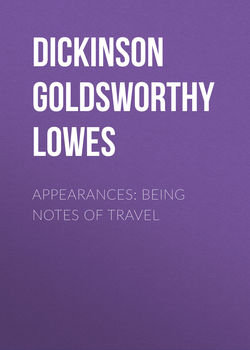Читать книгу Appearances: Being Notes of Travel - Dickinson Goldsworthy Lowes - Страница 7
PART I
INDIA
VI
AN INDIAN SAINT
ОглавлениеIt was at Benares that we met him. He led us through the maze of the bazaars, his purple robe guiding us like a star, and brought us out by the mosque of Aurungzebe. Thence a long flight of stairs plunged sheer to the Ganges, shining below in the afternoon sun. We descended; but, turning aside before we reached the shore, came to a tiny house perched on a terrace above the ghat. We took off our shoes in the anteroom and passed through a second chamber, with its riverside open to the air, and reached a tiny apartment, where he motioned us to a divan. We squatted and looked round. Some empty bottles were the only furniture. But on the wall hung the picture we had come to see. It was a symbolic tree, and perhaps as much like a tree as what it symbolised was like the universe. Embedded in its trunk and branches were coloured circles and signs, and from them grew leaves and flowers of various hues. Below was a garden lit by a rising sun, and a black river where birds and beasts pursued and devoured one another. At our request he took a pointer and began to explain. I am not sure that I well understood or well remember, but something of this kind was the gist of it. In the beginning was Parabrahma, existing in himself, a white circle at the root of the tree. Whence sprang, following the line of the trunk, the egg of the universe, pregnant with all potentialities. Thence came the energy of Brahma; and of this there were three aspects, the Good, the Evil, and the Neuter, symbolised by three triangles in a circle. Thence the trunk continued, but also thence emerged a branch to the right and one to the left. The branch to the right was Illusion and ended in God; the branch to the left was Ignorance and ended in the Soul. Thus the Soul contemplates Illusion under the form of her gods. Up the line of the trunk came next the Energy of Nature; then Pride; then Egotism and Individuality; whence branched to one side Mind, to the other the senses and the passions. Then followed the elements, fire, air, water, and earth; then the vegetable creation; then corn; and then, at the summit of the tree, the primitive Man and Woman, type of Humanity. The garden below was Eden, until the sun rose; but with light came discord and conflict, symbolised by the river and the beasts. Evil and conflict belong to the nature of the created world; and the purpose of religion is by contemplation to enable the Soul to break its bodies, and the whole creation to return again to Parabrahma, whence it sprung.
Why did it spring? He did not know. For good or for evil? He could not say. What he knew he knew, and what he did not know he did not. "Some say there is no God and no Soul." He smiled. "Let them!" His certainty was complete. "Can the souls of men be reincarnated as animals?" He shrugged his shoulders. "Who can say?" I tried to put in a plea for the life of action, but he was adamant; contemplation and contemplation alone can deliver us. "Our good men," I said, "desire to make the world better, rather than to save their own souls." "Our sages," he replied, "are sorry for the world, but they know they cannot help it." His religion, I urged, denied all sense to the process of history. "There may be process in matter," he replied, "but there is none in God." I protested that I loved individual souls, and did not want them absorbed in Parabrahma. He laughed his good cheery laugh, out of his black beard, but it was clear that he held me to be a child, imprisoned in the Ego. I felt like that, and I hugged my Ego; so presently he ministered to it with sweetmeats. He even ate with us, and smoked a cigarette. He was the most human of men; so human that I thought his religion could not be as inhuman as it sounded. But it was the religion of the East, not of the West. It refused all significance to the temporal world; it took no account of society and its needs; it sought to destroy, not to develop, the sense and the power of Individuality. It did not say, but it implied, that creation was a mistake; and if it did not profess pessimism, pessimism was its logical outcome. I do not know whether it is the religion of a wise race; but I am sure it could never be that of a strong one.
But I loved the saint, and felt that he was a brother. Next morning, as we drifted past the long line of ghats, watching the bright figures on the terraces and stairs, the brown bodies in the water, and the Brahmins squatting on the shore, we saw him among the bathers, and he called to us cheerily. We waved our hands and passed on, never to see him again. East had not met West, but at least they had shaken hands across the gulf. The gulf, however, was profound; for many and many incarnations will be needed before one soul at least can come even to wish to annihilate itself in the Universal.
